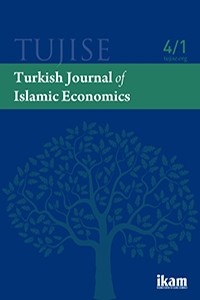Why Islamic Banks Are Reluctant to Offer Musharakah Mutanaqisah for Home Financing: The Case of Maybank Islamic and Affin Islamic Bank
Why Islamic Banks Are Reluctant to Offer Musharakah Mutanaqisah for Home Financing: The Case of Maybank Islamic and Affin Islamic Bank
This paper focuses on the challenges faced by Maybank Islamic and Affin Islamic Bank in implementing Musharakah Mutanaqisah (MM) Home Financing. Drawing upon two in-depth semi-structured interviews with these two banks’ leading officers who are actively involved in Islamic banking, the paper offers a list of key challenges faced by Maybank Islamic in implementing Musharakah Mutanaqisah Home Financing which lead the bank to change to Commodity Murabahah (CM) Home Financing. The reasons are advance rental that needs to be returned to the customer if the house is abandoned, refinancing issue, and marketing decision. In addition, the paper discusses the factors contributing to Affin Islamic Bank’s decision to continue offering Musharakah Mutanaqisah Home Financing. The reasons are minimising the use of Tawarruq contract, conformity with Bank Negara Malaysia’s (BNM) Ijarah Guidelines, no previous case of abandonment, product diversification, and comprehensive risk mitigation plan. This paper concludes by suggesting recommendations that may be adopted by Islamic banks and the regulators to facilitate the promotion of Musharakah Mutanaqisah Home Financing products. Notably, this paper offers empirical findings which are different from the previous literature.This paper focuses on the challenges faced by Maybank Islamic and Affin Islamic Bank in implementing Musharakah Mutanaqisah (MM) Home Financing. Drawing upon two in-depth semi-structured interviews with these two banks’ leading officers who are actively involved in Islamic banking, the paper offers a list of key challenges faced by Maybank Islamic in implementing Musharakah Mutanaqisah Home Financing which lead the bank to change to Commodity Murabahah (CM) Home Financing. The reasons are advance rental that needs to be returned to the customer if the house is abandoned, refinancing issue, and marketing decision. In addition, the paper discusses the factors contributing to Affin Islamic Bank’s decision to continue offering Musharakah Mutanaqisah Home Financing. The reasons are minimising the use of Tawarruq contract, conformity with Bank Negara Malaysia’s (BNM) Ijarah Guidelines, no previous case of abandonment, product diversification, and comprehensive risk mitigation plan. This paper concludes by suggesting recommendations that may be adopted by Islamic banks and the regulators to facilitate the promotion of Musharakah Mutanaqisah Home Financing products. Notably, this paper offers empirical findings which are different from the previous literature.
Keywords:
Musharakah Mutanaqisah, Reluctant Reasons, Advance Rental,
___
- 1. Alam Asadov, Zulkarnain Bin Muhamad Sori, Shamsher Ramadilli, Zaheer Anwer, Shinaj Shamsudheen. (2015). Musharakah Mutanaqisah Home Financing : Issues in Practice. Journal of Islamic Accounting and Business Research.
- 2. Chazi, A., Syed, L. A. M., Chazi, A., Syed, L. A. M., Finance, M. E., Ahmed, A., … Ahmed, A. (2016). Rental index rate as an alternative to interest rate in Musharakah Mutanaqisah home financing (A simulation approach). International Journal of Islamic and Middle Eastern Finance and Management Article Information.
- 3. Fariha et al. (2013). An Evaluation On Musharakah Mutanaqisah Based House Financing By Islamic Banks In Malaysia. Journal of Chemical Information and Modeling, 53(9), 1689–1699. https://doi.org/10.1017/CBO9781107415324.004
- 4. Hanira Hanafi. (2014). Current Practices of Islamic Home Financing: A Case of Musharakah Mutanaqisah in Malaysia, 1–7.
- 5. Lee Ching Lung. (2013). Musharakah Mutanaqisah Partnership in Malaysia’s Islamic Bank: A Comparison Between Theory and Practice. American Journal of Economics and Business Administration, 5(3), 95–106. https://doi.org/10.3844/ajebasp.2013.95.106
- 6. Mat Ali, S. A. (2016). A STUDY ON LAWS APPLICABLE TO MUSHARAKAH MUTANAQISAH HOME FINANCING IN MALAYSIA.
- 7. Mohamad, A. S. B. (2012). Musharakah Mutanaqisah Home Financing in Malaysia : A Critical Appraisal.
- 8. Mydin Meera, A. K., & Abdul Razak, D. (2015). Islamic Home Financing through Musharakah Mutanaqisah and al-Bay ’ Bithaman Ajil Contracts : A Comparative Analysis. Research Gate Publication, 9(2), 5–30.
- 9. Naim, A. M. (2011). Purchase Undertaking Issues in Musharakah Mutanaqisah Home Financing. ISRA International Journal of Islamic Finance, 3(1), 25–48.
- 10. Rafe Haneef, Sherin Kunhibava, & Edib Smolo. (2011). Musharakah Mutanaqisah and Legal Issues: Case Study of Malaysia. ISRA International Journal of Islamic Finance, 3(1), 91–122.
- 11. Shariah Advisory Council. (n.d.). Resolutions of Shariah Advisory Council of Bank Negara Malaysia, 1–38.
- 12. Smolo, E., & Kabir Hassan, M. (2011). The potentials of mushārakah mutanāqisah for Islamic housing finance. International Journal of Islamic and Middle Eastern Finance and Management, 4(3), 237–258. https://doi.org/10.1108/17538391111166476
- 13. Subky et al. (2017). The Implication of Musharakah Mutanaqisah in Malaysian Islamic Banking Arena: A Perspective on Legal Documentation. International Journal Of Management and Applied Research, 4(1), 17–30. https://doi.org/10.18646/2056.41.17-003
- 14. Wei, K. L. K., & Hassanudin. (2017). Qualitative Research in Financial Markets A qualitative inquiry into Islamic home financing : evidence from Malaysia. Emerald Insight. https://doi.org/10.1108/QRFM-07-2016-0020
- 15. Marina Hamzah, Interview by Authors, Meeting Room 4, Level 19 Dataran Maybank Bangsar, Kuala Lumpur, 20 November 2017
- 16. Mohd Faiz bin Rahim, Interview by Authors, Room 11, 17th Floor, Menara Affin, Jalan Raja Chulan, Kuala Lumpur, 4 December 2017
- Başlangıç: 2014
- Yayıncı: Research Center for Islamic Economics (ikam)
Sayıdaki Diğer Makaleler
Masudul Alam Choudhury. Islamic Financial Economy and Islamic Banking
Expanding the Frontiers of Economics: Some Insights from the Qur’anic Revelation
Muhammad Al Bashir Muhammad Al Amine. Islamic Finance and Africa’s Economic Resurgence
Are Islamic Banks The Alternative to Commercial Banks?
Nurul 'iffah M A ZAABA, Rusni HASSAN
Imran Khan, Syeda Nitasha ZAHİD
Rania Abdelfattah Salem. Risk Management for Islamic Banks
Zamir Iqbal and Abbas Mirakhor. Ethical Dimensions of Islamic Finance: Theory and Practice
